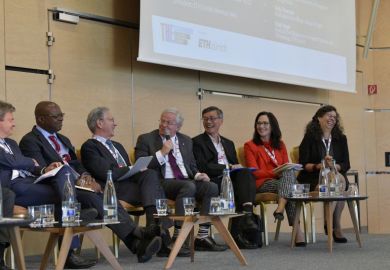Male PhD graduates in the UK are more likely to get a full-time, permanent job than their female peers, but the difference is much smaller within the academic sector, a new study has found.
The paper reveals that 51 per cent of male graduates surveyed were employed in a permanent position six months after graduation, compared with 41 per cent of female graduates. This gap increases to 74 per cent and 61 per cent respectively three years after graduation.
At seven to nine years after graduation, the gender gap had slightly decreased, so that 82 per cent of men and 75 per cent of women were in permanent employment at that time. Meanwhile, 97 per cent of male graduates were working in a full-time job at this stage, compared with only 80 per cent of female graduates.
The study, published in the journal Social Sciences, was based on data on 466 women and 684 men from the 2013 UK Doctoral Impact and Career Tracking Survey, which was commissioned by Research Councils UK and the higher education funding bodies for England and Wales.
More than half of the graduates surveyed were working in the higher education sector, with women more likely to work in academia than men.
Half of the male respondents obtained their doctorate in physical sciences and engineering, compared with only a quarter of the female respondents. Women were more likely to obtain their degree in the arts and humanities, social sciences or biomedical studies.
Nitzan Peri-Rotem, a social demographer at the University of Exeter and author of the study, said that this partly explained the difference in career prospects, as there are more work opportunities in the subjects studied by men.
The study also found that the gender gap was considerably smaller within academia, where 72 per cent of men were permanently employed, compared with 69 per cent of women. The parallel figures for non-academic jobs were 91 per cent and 84 per cent respectively. Dr Peri-Rotem said that this may be because of stricter regulations in the academic hiring process, as well as the fact that female PhD graduates were more likely to seek employment in academia than in other sectors.
In the study, Dr Peri-Rotem says that universities should be encouraged to expand the supply of permanent positions available in order to redress the imbalance in career prospects. Employers should also be given greater incentives, such as tax benefits or other state support, to promote equal gender representation, she adds.
Register to continue
Why register?
- Registration is free and only takes a moment
- Once registered, you can read 3 articles a month
- Sign up for our newsletter
Subscribe
Or subscribe for unlimited access to:
- Unlimited access to news, views, insights & reviews
- Digital editions
- Digital access to THE’s university and college rankings analysis
Already registered or a current subscriber?








